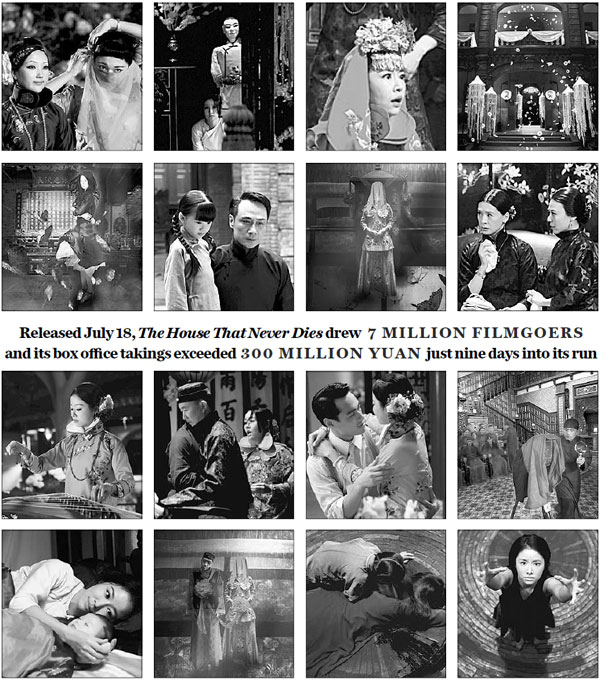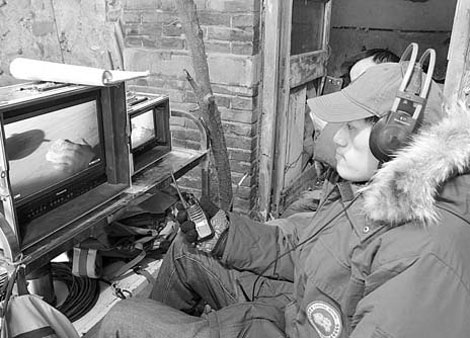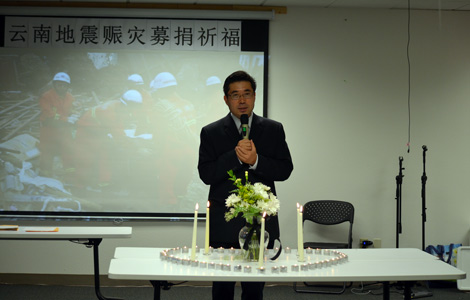Frighteningly bad
Updated: 2014-08-11 14:36
By Liu Zhihua (China Daily USA)
|
||||||||
Chinese horror movies are notorious for provoking snorts of derision rather than racing pulses ... until now, that is.
Horror movie fans Cao Zhong and Lu Jia recently had a fierce argument about whether to go and see a recently released Chinese movie, The House That Never Dies.
Lu was keen to head to the cinema, having seen ads and trailers that piqued her curiosity about the first Chinese-made big-budget 3-D horror movie, the plot of which centers around an abandoned, reputedly haunted, mansion in downtown Beijing.
|
Scenes from The House That Never Dies, which is one of the most successful productions on the Chinese mainland. Photos provided to China Daily |
Cao was far less eager to see the movie, after being massively disappointed by a domestically produced horror film he saw a few years ago. "I can't remember the name or anything about the movie, but it was complete junk, just a collection of scenes tied together without any logic," he says, and quotes a friend who once commented that for real lovers of horror movies, watching a Chinese-made offering is like being in one, because they are so crudely shot and the plots are so ridiculous.
However, that could be about to change. The House That Never Dies has become a huge box office hit. Directed by the Hong Kong director Raymond Yip, the thriller was released in cinemas on July 18, and raked in 45 million yuan ($7.2 million) on its first day, according to 1905, a movie news and ratings website affiliated to the State Administration of Press, Publication, Radio, Film and Television.
In the first two days after release, the movie earned more than 100 million yuan. Nine days into its run, it had been viewed by more than 7 million people and the box office takings exceeded 300 million yuan.
Media reports said it's a "miracle" that a domestic horror movie has achieved such high office box returns and become so influential.
In fact, the movie has become so popular that a group of adventure seekers have visited the old mansion in downtown Beijing that inspired the movie, which tells the stories of two generations living in the house. The director and crew weren't allowed to shoot in the house itself, so they used replica sets constructed in a studio.
Zhang Zixuan, a fan who saw the movie shortly after it was released, said its popularity lies in the well-plotted, overlapping storylines, scary sound effects, an all-star cast, and most importantly, 3-D presentation.
The success of The House That Never Dies is a far cry from 2002, when the domestic movie market began growing rapidly and Chinese horror movies invariably scored low ratings and attracted huge amounts of criticism.
"Horror movies are supposed to feature scenes that will terrify the audience, but domestic horror movies are not scary at all," says Zhang Ting, a 27-year-old from Qingdao, Shandong province. "I just don't understand why people make such bad movies," she said.
On movie websites, Chinese horror films often score ratings below six, usually falling into the two to four bracket, out of 10, and often attract comments such as "crudely shot", "ridiculous", "an insult to my IQ", and "boring".
Yet, despite their terrible reputation, dozens of such movies are made in China every year, and in 2012 the State Administration of Press, Publication, Radio, Film and Television approved more than 200 for filming, according to Mtime, a popular movie website. Why? Well, the reason is simple - these movies make money.
Good for dating
According to China Daily's Raymond Zhou, a respected critic, the form often deals with hidden fears and terror of the unknown, such as ghosts, aliens and cold-eyed killers, and has solid fan base among teenagers and young adults.
There's a theory that horror films and thrillers are the best movies for couples on dates, because few things are more romantic than snuggling up while watching a scary movie, Zhou adds.
Lu Shaoyang, a movie critic and dean of the School of Journalism and Communication at Peking University, says horror movies are an important and successful genre in many countries, including the United States, because they are relatively cheap to shoot, but can easily generate high profits.
In China, the genre has developed rapidly in the past decade, even though there is no mature production mechanism capable of raising investment and producing good screenplays, such as that seen in Hollywood, according to Lu.
Chen Hui, founder and general manager of Fujian Heng Ye Film Distribution Co, is fully aware of the opportunities and challenges that accompany the production and distribution of horror movies in China.
When the company was established seven years ago, it employed fewer than 10 people, but now it's one of the largest private producers and distributors of movies in the country. It's fortune has been built on the horror genre.
Born in the 1970s, Chen started managing cinemas in 1995, and quickly realized that Chinese audiences, especially the younger generation, wanted to see horror movies, but there were few on the market. In response, he established Fujian Heng Ye in 2007.
During the years that followed, the company distributed 16 horror movies - the only one that didn't make money was released in 2012 but gained few screenings because it was overshadowed by the wildly successful Lost in Thailand.
In 2008, Fujian Heng Ye began producing horror movies. The first, Illusion Apartment, released in 2010, cost 1.8 million yuan to make, but earned more than 20 million yuan at the box office. That was just the beginning.
Over the years, the company's horror movies have been successful, which has enabled it to expand into romances and other genres, and also to begin making big-budget horror flicks.
However, Fujian Heng Ye is just one of many outfits to have recognized the money-making potential of horror movies.
Zhou Yaowu, who started directing horror movies in 2010, says the appeal of horror movies lies in their violent, bloody and erotic scenes - an established formula for box office success, and one that's prompted a large number of potential investors to contact him.
Zhou's first horror movie, Harpoon, based on a survival game story, earned about 5 million yuan, even though the distributor chose the wrong market strategy and released the movie during the Spring Festival holiday in early 2012.
For the director, one of the beauties of horror movies is that they can be made with a minimal cast and simple props and settings, which lowers the investment barrier: "A few million yuan will do nothing in most genres, but it's enough to make a horror movie."
Fledgling director Xing Bo is determined to work in the genre in the early stages of his career because he thinks it will be easier to raise funds for horror movies than any other type of film.
He may be on the right track, too, because since he graduated from the Beijing Film Academy in 2012, Xing has been approached by several investors, mainly from the property sector.
An added bonus, Xing believes, is that horror movies are a good medium for novice directors to learn how to deal with casts and crews, and how to present a story scene by scene.
Before Xing makes a horror movie, his team surveys potential audience members to discover the kinds of storylines and scenes that will appeal to them most. Once the survey is complete, he sits down to write the screenplay based on the results.
However, the genre's popularity with investors and movie producers is just one side of the coin.
Zhang Ting, an avid viewer of the best-known offerings from the US, Japan, South Korea, Thailand and Europe, says domestic movies are in fierce competition with foreign-made films. The homemade variety has never been her first choice, and she says she has never heard any of her friends praise a domestic horror movie, even those who really love the genre.
Poor quality films can still be successful, for course. In 2011, Mysterious Island, starring actress Yang Mi, grossed more than 90 million yuan at the box office, despite scoring just 3.2 points out of 10 on Douban, one of China's most-popular movie websites.
The film, directed by Chung Kai-cheung, begins with a scene where a ghostly wind chases a small boy and his mother, played by Yang, who dies after a fall. The story then cuts to a boat carrying handsome men and bikini-clad women who are heading to an abandoned island to compete in a survival game. However, once they arrive at the island, an apparently supernatural force kills the competitors one by one, until only Yi Lin, who is also played by Yang, and Peng Fei, played by Jordan Chan, remain alive. At the end, it turns out Chan's character is the killer; his murderous streak is prompted by the fact that there is hidden treasure on the island and he doesn't want the others to find it. Finally, a rough sort of justice prevails when Chan is killed by a weak-looking Yang.
The murders were supposed to be bloody, scary and mysterious, but instead, they appeared to occur randomly and unaccountably.
Poorly plotted
The reviews of Mysterious Island were unremittingly critical of its plot and shabby sets, but the film is far from the worst on offer, many of them scoring fewer than three points on Douban.
Even Xing and Zhou admit that Chinese-made horror movies lack bite because most of them try to scare the audience in unsuccessful, straightforward ways by using images of ghosts and murders, rather than clever, suspenseful plots. Audiences often mock the endings when the supernatural powers or ghosts are revealed to be imaginary or illusions dreamed up when the characters are sleeping, writing novels, drugged, or have mental health issues.
According to Fujian Heng Ye's Chen, the clumsy plots of domestic horror movies are the result of a dearth of excellent writers, a universal problem in the Chinese movie industry, although the government's ban on ghosts and superstition in plotlines can limit creativity.
Also, because some investors believe low budgets are sufficient for horror movies, few domestic productions attract more than 10 million yuan, and most only receive 3 to 6 million yuan. The lack of funding means few top-tier actors or directors work within the genre, and it's impossible for filmmakers to provide convincing visual all sound effects, Chen says.
Audience tastes have matured in the past decade, and it's becoming increasingly difficult, if not impossible, to satisfy Chinese audiences with badly produced, poorly plotted horror movies. In fact, in recent years a number of homegrown horror movies have barely recouped their costs, and some have even lost money. However, the success of The House That Never Dies is a milestone that could lead to domestic horror movies becoming exquisite, big-budget productions, Chen adds.
Cao, the Beijing resident and horror movie fan, has resolved not to see The House That Never Dies, even though his partner Lu watched it and awarded it seven out of 10: "I have no confidence in domestic horror movies, at least not at the present time."
Contact the author at liuzhihua@chinadaily.com.cn
|
Director Xing Bo at work. Xing is one of young directors who start with their career with horror movies. Provided to China Daily |

(China Daily USA 08/11/2014 page8)
Most Viewed
Editor's Picks

|

|

|

|

|

|
Today's Top News
'Hackers' compete for funds in Silicon Valley
Many Chinese economic fugitives still at large in US
Police focus on emigrants who still have their hukou
Chinese Ebola doctors leave for Africa
At least 39 killed in Tehran jet crash
US is top destination for Chinese fugitives
Beijing 'open' to US airstrikes in Iraq
Foreigners jailed for obtaining data
US Weekly

|

|


















